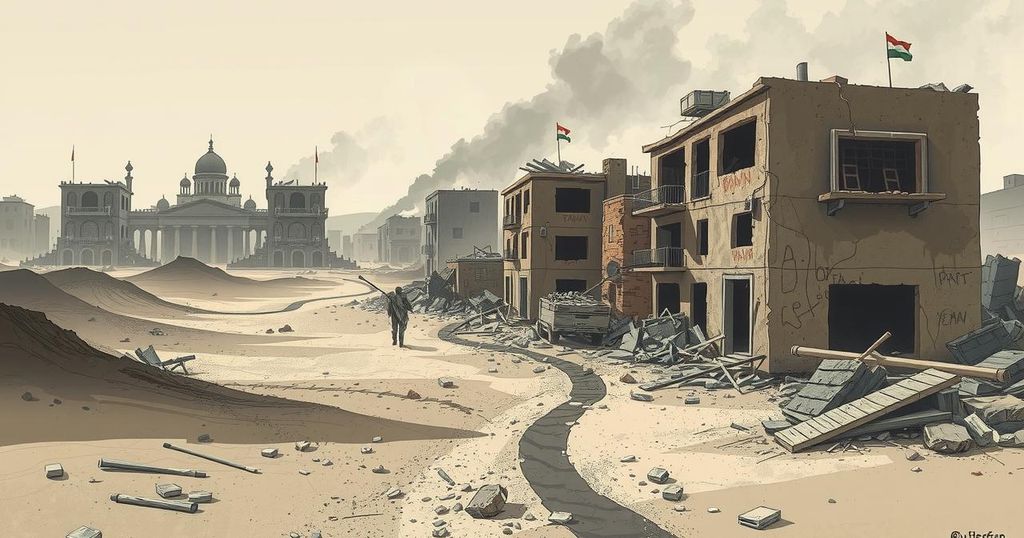Escalation of US Bombing Campaign Deepens Humanitarian Crisis in Yemen

The U.S. bombing campaign in Yemen has intensified civilian casualties amidst an ongoing humanitarian crisis, with significant destruction of infrastructure reported. Following cuts to aid under the Trump administration, aid workers face increasing challenges in delivering assistance. The effectiveness of military strikes in curbing Houthi forces is debated, as the conflict continues to affect millions in dire need.
The intensification of the United States bombing campaign in Yemen has exacerbated the already critical humanitarian crisis in the region. Following the reduction of aid by former President Donald Trump, local sources including humanitarian workers and rights organizations express heightened fears of civilian casualties and destruction. Siddiq Khan, the Country Director for Islamic Relief in Yemen, stated, “Now the rampant bombing has started, you never know which way things will go.”
The U.S. airstrikes, ongoing for over two weeks, primarily target the Houthi movement which controls substantial portions of Yemen. This military action, characterized as punitive against the Houthis following their attacks on Red Sea shipping, represents a significant escalation by the U.S. The airstrikes have been described as unprecedented since President Trump resumed power, with the directive to strike explicitly articulated by him.
Public revelations from a private communication among U.S. officials revealed additional details about the military operations. National Security Adviser Mike Waltz reported the death of a Houthi missile commander. However, he omitted any mention of civilian casualties, leading to concerns about the humanitarian implications of such military engagements.
Targets of the strikes include densely populated urban centers, making it challenging to assess civilian impacts accurately. Niku Jafarnia from Human Rights Watch highlighted the difficulties in obtaining information regarding bomb sites due to Houthi restrictions. She noted that “there is no question there are civilian casualties,” particularly in residential areas struck during nighttime raids.
Accusations against the U.S. military included targeting a cancer hospital, perceived as violations of international humanitarian law. The Yemen Data Project reported at least 25 civilian deaths during the first week of bombings, pointing to significant destruction of civilian infrastructure such as schools and residential areas.
The ongoing conflict has decimated Yemen’s economy, leading to immense humanitarian needs. Approximately 19 million individuals, including 15 million women and children, now require assistance, while UNICEF indicates that half of all children under five suffer from malnutrition. Despite this dire situation, aid funding remains alarmingly low.
Siddiq Khan reiterated that the recent U.S. bombings place additional stress on an aid sector already weakened by funding cuts and legal risks associated with aid to Houthi territories. The growing pressure has prompted some organizations to reduce their operations, raising concerns about the future of humanitarian efforts in Yemen.
Anonymous sources within the aid community described the overwhelming difficulty in navigating simultaneous challenges, including Houthi restrictions and the risk posed by U.S. legal measures. Despite these obstacles, aid workers express a firm commitment to serving affected communities.
Washington’s military involvement is just one facet of a complex conflict involving multiple stakeholders, including regional adversaries such as Saudi Arabia. The effectiveness of the U.S. bombing, however, remains contested, as the resilient Houthi group continues to endure despite years of escalated military actions.
The U.S. bombing campaign in Yemen has significantly worsened the humanitarian crisis, with reports of civilian casualties and extensive destruction. Humanitarian organizations are struggling to operate effectively amidst legal and funding challenges, leaving millions in urgent need of aid. As violence escalates, the resilience of the health and aid services continues to be tested, while the effectiveness of U.S. military interventions in achieving strategic objectives remains questionable.
Original Source: www.theguardian.com








